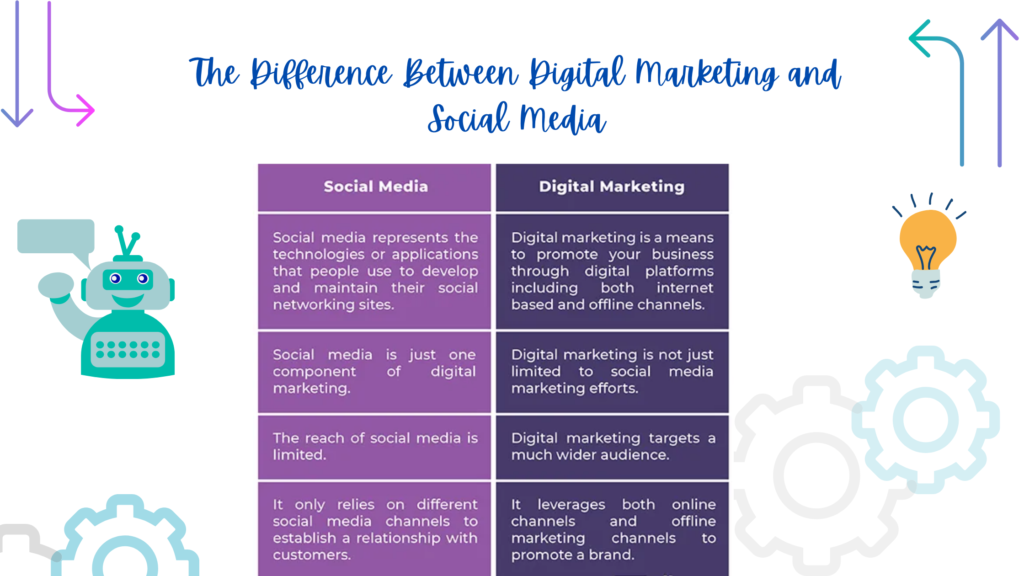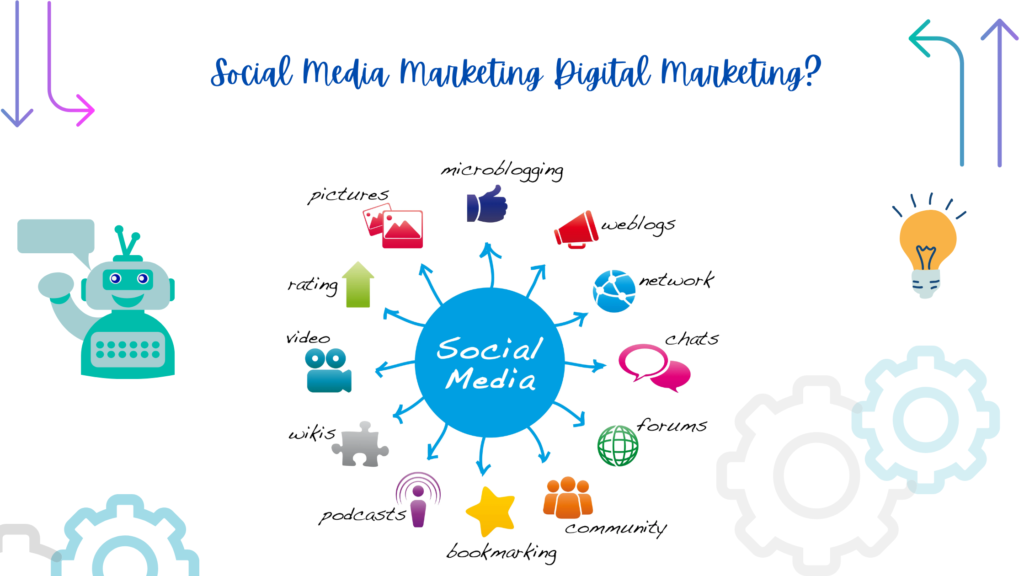The Difference Between Digital Marketing and Social Media

Digital Marketing
Digital marketing refers to the broad set of marketing techniques and strategies that leverage digital technologies and channels to promote products, services, or brands. It encompasses a wide range of online activities, including website optimization, email marketing, content marketing, search engine optimization (SEO), pay-per-click (PPC) advertising, and more. The primary goal of digital marketing is to reach and engage with target audiences through various digital platforms, ultimately driving conversions, sales, and brand awareness.
Social Media
Social media, on the other hand, refers specifically to online platforms and applications that facilitate the creation and sharing of user-generated content, enabling social interactions and networking. Popular social media platforms include Facebook, Instagram, Twitter, LinkedIn, Snapchat, TikTok, and YouTube, among others. Social media is primarily focused on fostering connections, building communities, and facilitating two-way communication between brands and their audiences.
Objectives
Digital Marketing Objectives
The primary objectives of digital marketing campaigns can vary depending on the specific goals of a business or organization. However, some common objectives include:
- Increasing brand awareness and visibility
- Driving website traffic and generating leads
- Boosting online sales and revenue
- Improving customer engagement and retention
- Building and nurturing customer relationships
- Enhancing search engine rankings and visibility
Social Media Objectives
While social media can contribute to some of the objectives mentioned above, its primary objectives are more focused on:
- Building and engaging with online communities
- Fostering customer relationships and loyalty
- Increasing brand recognition and reputation
- Providing customer support and addressing inquiries
- Monitoring and responding to customer feedback and sentiment
- Promoting user-generated content and influencer marketing
Channels
Digital Marketing Channels
Digital marketing leverages a diverse range of online channels and platforms, including:
- Websites and landing pages
- Search engines (e.g., Google, Bing)
- Email and SMS marketing
- Display advertising (e.g., banners, rich media ads)
- Content marketing (e.g., blogs, articles, videos)
- Affiliate marketing
- Influencer marketing
- Mobile apps and mobile marketing
Social Media Channels
Social media primarily operates through various social networking platforms, such as:
- Snapchat
- TikTok
- YouTube
These platforms offer unique features, audiences, and content formats, allowing businesses to tailor their social media strategies accordingly.
Tactics and Strategies
Digital Marketing Tactics
Digital marketing employs a wide range of tactics and strategies to achieve its objectives, including:
- Search Engine Optimization (SEO)
- Pay-Per-Click (PPC) advertising
- Content marketing (e.g., blog posts, videos, infographics)
- Email marketing campaigns
- Affiliate and influencer marketing
- Remarketing and retargeting
- Website optimization and conversion rate optimization (CRO)
- Data analytics and performance tracking
Social Media Tactics
Social media marketing, on the other hand, utilizes tactics specifically designed for social platforms, such as:
- Social media content creation and curation
- Social media advertising and sponsored posts
- Influencer collaborations and influencer marketing
- Community management and engagement
- Social media monitoring and listening
- User-generated content campaigns
- Social media contests and giveaways
- Live streaming and real-time interactions
Audience Targeting and Personalization
Digital Marketing Audience Targeting
Digital marketing enables highly targeted and personalized approaches to reach specific audiences based on various factors, including:
- Geographic location
- Demographic data (e.g., age, gender, income)
- Psychographic characteristics (e.g., interests, behaviors, values)
- Browser and search history
- Online behaviors and preferences
These targeting capabilities allow digital marketers to deliver relevant and tailored messages to their desired audiences, increasing the effectiveness of their campaigns.
Social Media Audience Targeting
Social media platforms also offer robust targeting options for businesses and advertisers, such as:
- Location-based targeting
- Interest-based targeting
- Demographic targeting (e.g., age, gender, education)
- Behavioral targeting (e.g., online activities, app usage)
- Custom audience targeting (e.g., email lists, website visitors)
- Lookalike audience targeting
Additionally, social media platforms leverage user data and interactions to deliver personalized content and advertisements based on individual preferences and behaviors.
Integration and Synergy
While digital marketing and social media are distinct concepts, they are highly interconnected and often work in tandem to create effective and comprehensive marketing strategies. By leveraging the strengths of both approaches, businesses can achieve greater reach, engagement, and overall marketing success.
Digital Marketing and Social Media Integration
Integrating digital marketing and social media efforts can yield numerous benefits, such as:
- Amplifying content and campaign reach across multiple channels
- Driving website traffic and lead generation through social media
- Utilizing social media for customer service and support
- Leveraging social media data and insights for targeted advertising
- Incorporating social media influencers into content marketing strategies
- Repurposing and cross-promoting content across digital and social channels
Measurement and Analytics
Both digital marketing and social media campaigns rely heavily on data and analytics to measure success, optimize strategies, and make informed decisions. Various tools and platforms are available to track and analyze metrics such as website traffic, conversions, engagement rates, social media reach, and return on investment (ROI).
Challenges and Considerations
While digital marketing and social media offer numerous opportunities for businesses, they also present their own set of challenges and considerations.
Digital Marketing Challenges
- Keeping up with constantly evolving technologies and algorithms
- Standing out in a crowded and competitive online landscape
- Ensuring compliance with data privacy regulations and laws
- Managing and optimizing campaigns across multiple channels
- Measuring and attributing success to specific tactics and campaigns
Social Media Challenges
- Maintaining consistent and engaging social media presence
- Navigating the unique features and best practices of each platform
- Dealing with negative feedback and online reputation management
- Staying up-to-date with rapidly changing social media trends and algorithms
- Balancing organic and paid social media efforts
Roles and Responsibilities
The roles and responsibilities within digital marketing and social media teams can vary depending on the size and structure of an organization. However, some common roles include:
Digital Marketing Roles
- Digital Marketing Manager/Director
- SEO Specialist
- PPC Specialist
- Content Marketer
- Email Marketing Specialist
- Analytics and Data Analyst
- Web Developer/Designer
Social Media Roles
- Social Media Manager/Strategist
- Content Creator (e.g., copywriter, graphic designer, videographer)
- Community Manager
- Influencer Marketing Manager
- Social Media Analyst
- Social Media Advertising Specialist
Best Practices
To maximize the effectiveness of digital marketing and social media efforts, it’s essential to follow best practices and stay up-to-date with industry trends and developments.
Digital Marketing Best Practices
- Develop a comprehensive digital marketing strategy aligned with business goals
- Conduct thorough research and competitor analysis
- Optimize website and landing pages for user experience and conversions
- Create high-quality, valuable, and engaging content
- Implement effective SEO and keyword research strategies
- Leverage data and analytics for campaign optimization and decision-making
- Stay compliant with privacy regulations and industry best practices
Social Media Best Practices
- Define clear social media goals and objectives
- Understand and cater to the unique audiences and content formats of each platform
- Create a content calendar and maintain a consistent posting schedule
- Engage with your audience and foster meaningful conversations
- Monitor and respond to comments, mentions, and direct messages promptly
- Leverage influencer marketing and user-generated content
- Analyze and adapt based on social media metrics and insights
The Future of Digital Marketing and Social Media
As technology continues to evolve rapidly, the landscape of digital marketing and social media will undoubtedly undergo significant changes and advancements. Some potential future trends and developments include:
- Increased emphasis on personalization and hyper-targeted messaging
- Integration of artificial intelligence (AI) and machine learning for content creation and optimization
- Adoption of immersive technologies like augmented reality (AR) and virtual reality (VR) in marketing campaigns
- Rise of voice search and conversational marketing
- Greater emphasis on privacy and data protection
- Continued growth of social commerce and shoppable posts
- Emergence of new social media platforms and channels
- Increased use of live streaming and real-time content
- Integration of blockchain technology for enhanced transparency and security
The future of digital marketing and social media is exciting, and businesses that stay ahead of these trends and adapt their strategies accordingly will be well-positioned for success in the ever-evolving digital landscape.


